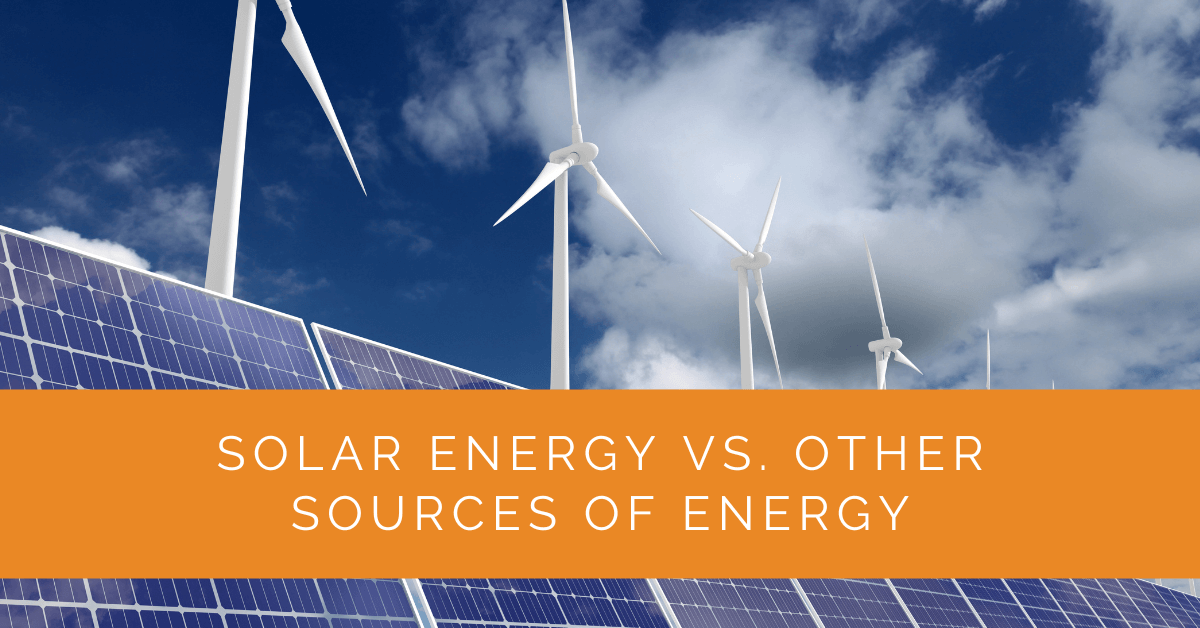Choosing the right energy source is crucial today, where sustainability and environmental concerns are paramount. As the demand for renewable energy grows, solar energy has emerged as a viable and promising option. This article will delve into solar energy, comparing it to other sources and exploring its advantages and disadvantages. Whether you’re considering installing solar panels or simply interested in understanding solar power, this article will provide valuable insights.
Contents
- 1 Key Takeaways
- 2 Understanding Solar Energy
- 3 Comparing Solar Energy to Fossil Fuels
- 4 Solar Energy and Other Renewable Energy Sources
- 5 Going Solar: Advantages and Considerations
- 6 Case Study: Transitioning to Solar Energy for a Sustainable Future
- 7 Expert Insights From Our Solar Panel Installers About Solar Energy vs. Other Sources of Energy
- 8 Experience Solar Excellence with Us!
- 9 Conclusion
- 10 FAQ
Key Takeaways
- Solar energy offers numerous advantages, including clean and renewable power, reduced greenhouse gas emissions, energy independence, and potential long-term cost savings.
- While solar energy has disadvantages, such as initial high installation costs and dependence on sunlight, ongoing technological advancements are addressing these challenges, making solar power more viable and accessible.
- Compared to fossil fuels and other renewable energy sources, solar energy stands out for its minimal environmental impact, versatility, and widespread availability, making it a compelling choice for individuals and communities looking to transition to a sustainable energy source.
Understanding Solar Energy
Solar energy is the radiant light and heat from the sun that can be harnessed and converted into usable energy. Solar or photovoltaic (PV) panels are designed to capture this energy and generate electricity. The process involves using semiconductor materials within the panels, which create an electric current when exposed to sunlight.
Advantages of Solar Energy
- Clean and Renewable Energy Source: Solar energy is abundant and inexhaustible. Unlike fossil fuels, which are finite and contribute to pollution and climate change, solar power offers a clean and sustainable solution.
- Reduction in Greenhouse Gas Emissions: We can significantly reduce greenhouse gas emissions by using solar energy instead of fossil fuels. Solar panels produce electricity without releasing harmful pollutants into the atmosphere, helping combat climate change.
- Energy Independence and Security: Solar energy grants individuals and communities greater energy independence. By generating electricity on-site, we can reduce dependence on external sources and stabilize energy costs.
- Potential for Cost Savings and Long-Term Benefits: Although the initial installation costs of solar panels can be high, they can provide long-term financial benefits. Solar power can lower or eliminate electricity bills, offering significant savings over time.
Disadvantages of Solar Energy
- Initial High Installation Costs: One of the primary drawbacks of solar energy is the initial investment required for purchasing and installing solar panels. However, the long-term benefits and potential cost savings often outweigh this initial expense.
- Dependence on Sunlight and Weather Conditions: Solar panels use sunlight to generate electricity effectively. Cloudy days, shading, and variations in weather conditions can affect their efficiency. However, technological advancements are improving solar panel performance under less optimal conditions.
- Limited Energy Storage Capabilities: Solar energy production is intermittent, as it relies on daylight hours. Excess energy generated during peak sunlight can be stored in batteries or fed back into the grid for later use. However, current energy storage technologies have limitations in terms of capacity and cost.
- Manufacturing and Disposal Concerns: The production of solar panels involves using certain materials that may have environmental implications. However, ongoing research aims to improve the sustainability of solar panel manufacturing processes and recycling methods.

Comparing Solar Energy to Fossil Fuels
Fossil fuels, such as coal, oil, and natural gas, have traditionally been the dominant energy sources. However, their extensive use has led to numerous environmental challenges. Let’s compare solar energy to fossil fuels:
- Environmental Impact: Fossil fuels come with significant environmental consequences. Extraction and combustion of fossil fuels release greenhouse gases, contributing to global warming, air pollution, and ecological degradation. In contrast, solar energy has a minimal environmental footprint and helps combat climate change.
- Efficiency Comparison: Solar Panels vs. Fossil Fuel Extraction: Solar panels have significantly improved efficiency. With technological advancements, they can now convert more sunlight into electricity. In contrast, fossil fuel extraction and conversion processes involve significant energy losses and inefficiencies.
Solar Energy and Other Renewable Energy Sources
Solar energy is not the only renewable energy option available. Let’s explore how it compares to other sources:
- Wind Energy: Wind turbines harness wind power to generate electricity. While wind energy is also a clean and renewable energy source, it depends on wind patterns and requires open spaces for installation. On the other hand, solar energy can be harnessed in various locations and is not limited by wind availability.
- Hydroelectric Power: Hydroelectric power utilizes the force of flowing water to generate electricity. While it is a reliable and widely-used renewable energy source, it is limited to areas with suitable water resources, such as rivers and dams. On the contrary, solar energy can be harnessed almost anywhere, making it a more versatile option.
- Geothermal Energy: Geothermal energy taps into the heat beneath the Earth’s surface to generate power. It is a sustainable and constant energy source but location-dependent and limited to areas with geothermal activity. Solar energy provides a more widespread solution that can be implemented in various regions.
- Biomass Energy: Biomass energy involves converting organic matter, such as agricultural waste or wood pellets, into energy. While biomass can contribute to a diversified energy mix, it often requires large-scale infrastructure and may raise concerns about land use and emissions. Solar energy offers a cleaner and more accessible alternative.

Going Solar: Advantages and Considerations
Transitioning to solar energy offers numerous advantages and considerations that are worth exploring:
- Financial Incentives and Government Support for Solar Energy: Many governments and organizations provide financial incentives, tax credits, and grants to encourage the adoption of solar energy. These incentives can help offset the initial installation costs and make solar power more affordable for homeowners and businesses.
- The Role of Net Metering and Feed-in Tariffs: Net metering allows solar panel owners to feed excess electricity back into the grid, offsetting their energy consumption and potentially earning credits. Feed-in tariffs financially compensate renewable energy producers who contribute electricity to the grid. These mechanisms enhance the financial viability of solar energy systems.
- Assessing Solar Energy Costs and Return on Investment: When considering solar energy, evaluating the costs and potential savings over time is essential. Factors such as the cost of solar panels, installation, maintenance, and energy consumption patterns should be considered. Consulting with solar energy providers and performing a cost-benefit analysis can help determine the return on investment.
- Importance of Professional Installation and Maintenance: Proper installation and regular maintenance of solar panels are crucial for optimal performance and longevity. Working with reputable solar installation companies ensures the panels are positioned correctly and safely connected to the electrical system. Regular inspections and cleaning help maintain efficiency and prolong the panels’ lifespan.
Case Study: Transitioning to Solar Energy for a Sustainable Future
Background
Solar Panels Network USA recently assisted a small community in transitioning from traditional fossil fuels to renewable solar energy. The community aimed to reduce their carbon footprint, achieve energy independence, and explore the financial benefits of solar power.
Project Overview
The community consisted of several residential homes and a few small businesses, all previously reliant on fossil fuels for electricity. Our goal was to design and install a comprehensive solar energy system that would meet the community’s energy needs while providing environmental and financial benefits.
Implementation
The project began with a detailed assessment of the community’s energy consumption patterns and available space for solar installations.
- Energy Needs Assessment: We conducted an energy audit to determine the average and peak electricity consumption for both residential and commercial properties within the community.
- System Design: Based on the energy audit, we designed a system incorporating high-efficiency monocrystalline solar panels and battery storage solutions to ensure a reliable energy supply, even during periods of low sunlight.
- Cost Analysis: We provided a detailed cost analysis, including the initial investment, potential savings on electricity bills, and expected return on investment. We also highlighted available government incentives and tax credits that would offset the installation costs.
- Installation: Our team installed solar panels on rooftops and ground-mounted systems in open areas, ensuring optimal positioning for maximum sunlight exposure. The installation included inverters and a centralized monitoring system to track energy production and consumption.
Results
The transition to solar energy yielded significant environmental and financial benefits for the community.
- Environmental Impact: The community reduced their carbon emissions by approximately 80%, significantly decreasing their reliance on fossil fuels and contributing to a cleaner environment.
- Energy Independence: By generating their own electricity, the community achieved a high degree of energy independence, reducing their vulnerability to external energy price fluctuations and supply disruptions.
- Cost Savings: The community experienced a 60% reduction in their overall electricity costs. The savings from reduced energy bills and the income generated from net metering significantly offset the initial installation costs.
- Community Engagement: The project fostered a sense of community engagement and pride, as residents actively participated in the transition to renewable energy and contributed to a sustainable future.
Summary
This case study illustrates the tangible benefits of transitioning to solar energy. The community achieved significant environmental, financial, and social benefits by reducing reliance on fossil fuels and embracing renewable solar power. The project demonstrated that solar energy is a viable and sustainable solution for both residential and commercial applications.
At Solar Panels Network USA, we are dedicated to helping communities and individuals make the switch to clean, renewable energy. Our expertise in solar technology ensures that each project is tailored to meet specific needs, maximizing the benefits of solar energy and contributing to a sustainable future.
Expert Insights From Our Solar Panel Installers About Solar Energy vs. Other Sources of Energy
As a senior solar installer, I’ve seen firsthand the transformative impact of solar energy on both homes and businesses. Solar panels not only reduce reliance on fossil fuels but also provide long-term cost savings, making them a smart investment for a sustainable future.
Senior Solar Installer
One of the key advantages of solar energy is its versatility. Unlike other renewable sources like wind or hydro, solar panels can be installed almost anywhere, from rooftops to open fields, providing clean energy wherever it’s needed.
Lead Solar Technician
Technological advancements have significantly improved the efficiency and affordability of solar panels. This progress has made solar energy more accessible and viable, helping more people transition away from fossil fuels and towards a greener energy solution.
Chief Solar Engineer
Experience Solar Excellence with Us!
Trust in Solar Panels Network USA, where our seasoned experts deliver top-quality solar solutions for homes and businesses nationwide. With a legacy of countless successful installations and a commitment to sustainable energy, we’re your reliable partner in the solar journey. Ready for a brighter, eco-friendly future? Call us now at (855) 427-0058 and harness the power of the sun!
Conclusion
Solar energy offers a clean, renewable, and increasingly cost-effective alternative to traditional energy sources. Its numerous advantages, such as reduced greenhouse gas emissions, energy independence, and potential cost savings, make it an attractive option for individuals and communities. While solar energy does have its limitations, ongoing advancements in technology and energy storage are addressing many of these challenges.
Compared to fossil fuels and other renewable energy sources, solar energy stands out for its environmental benefits, versatility, and accessibility. By harnessing the sun’s power, we can generate electricity sustainably and contribute to a greener future.
So, if you’re considering a switch to renewable energy, going solar is a compelling choice. Embrace the advantages of solar energy, reduce your carbon footprint, and join the growing movement towards a cleaner and more sustainable energy future.
FAQ
Which is better, solar energy or fossil fuels?
Solar energy is considered a better option than fossil fuels for several reasons. Solar energy is clean, renewable, and helps reduce greenhouse gas emissions, whereas fossil fuels are finite, contribute to pollution, and have significant environmental impacts.
Can renewable energy replace fossil fuels?
Transitioning from fossil fuels to renewable energy sources, including solar energy, is essential for a sustainable future. While it may not be an immediate or complete replacement, renewable energy has the potential to significantly reduce our reliance on fossil fuels and mitigate environmental challenges.
How does solar energy compare to other energy sources?
Solar energy stands out among other energy sources due to its environmental benefits, versatility, and widespread availability. It is a clean and renewable en
About the Author
Solar Panels Network USA stands at the forefront of solar energy solutions, driven by a team of seasoned solar engineers and energy consultants. With over decades of experience in delivering high-quality solar installations and maintenance, we are committed to promoting sustainable energy through customer-centric, tailored solutions. Our articles reflect this commitment, crafted collaboratively by experts to provide accurate, up-to-date insights into solar technology, ensuring our readers are well-informed and empowered in their solar energy decisions.

